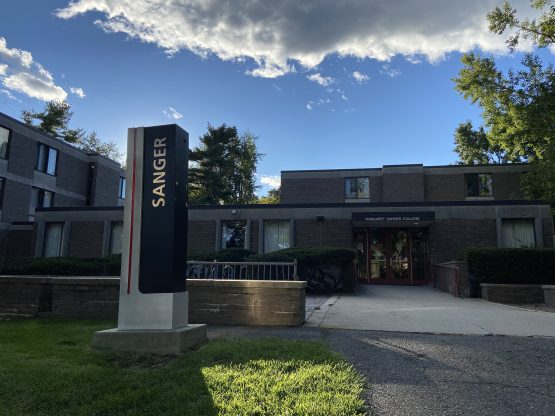
Stony Brook University President Maurie McInnis confirmed the school’s commitment to renaming Sanger Hall in an Undergraduate Student Government (USG) Senate meeting on Nov. 11.
“I said in advance of us hearing any requests from our community for renaming, let’s make sure we have a process in place. So we created a committee, the committee made recommendations about a process and now we have a process,” McInnis said.
The USG approved a resolution to openly address statements, beliefs and renaming Sanger Hall in a USG Senate meeting on Oct. 28. It also calls for the Renaming Buildings, Structures and Spaces Committee to review the case of Sanger’s memorization.
McInnis, who is an American South historian focusing on the issues of race and slavery, said that some of her most important work as vice provost of academic affairs in her former position at the University of Virginia was to share the history of slavery that went on at the institution. While there, she was on a committee that renamed buildings and named new buildings.
Fully knowing that the Stony Brook campus was created in the 1950s, during the peak of the civil rights movement, McInnis wanted to figure out the situation regarding building names at this institution. However, she realized that there wasn’t even a process made possible for considering renaming buildings.
Sanger Hall, a Stony Brook residence building located on the Tabler side of West Campus, is named after the reproductive-rights pioneer Margaret Sanger. In 1916, Sanger opened the first birth control clinic in the country, only for it to be raided and shut down nine days later. She later founded what is now called Planned Parenthood, a nonprofit organization providing reproductive health care.
USG Senator Malhar Virda, who played a significant role in creating the resolution, says there is a problem with the memorialization of someone like Sanger on campus.
“Margaret Sanger led off by saying that we just need the fittest of humanity to be alive. And I saw that as wrong,” Virda said.
Sanger has in past years been controversial for her beliefs on eugenics, a term defined as “the practice or advocacy of improving the human species by selectively mating people with specific desirable hereditary traits.”
This idea of selective breeding was “adopted by mainstream scientists, doctors, and the general public” during the 1920s and 1930s. Sanger tied her advocacy of birth control with that of eugenics, saying it was a way to end the breeding of the “unfit.”
More recently, Planned Parenthood has stated they denounced Sanger’s belief in eugenics. Even though Planned Parenthood has said that “Sanger tried to argue for a eugenics that was not applied based on race or religion” they believe that eugenics is an inherently racist, discriminatory and prejudiced ideology and anyone following those beliefs are set to cause harm to society.
In the summer of 2020, Virda began to work with his girlfriend Caitlyn Miller, who at the time was a USG senator, on research about Sanger and created initiatives to remove her name from campus.
The next step for USG is to communicate this resolution to the student body. Virda says the story of Sanger and her beliefs will gain traction here and there but eventually die down.
“I want it to create a stir in the student community that those in the faculty have told me has existed for over a couple of decades,” Virda said. He hopes “to see some progress and ultimately have Sanger college renamed, but the resolution itself is a baby step towards that process.”
















